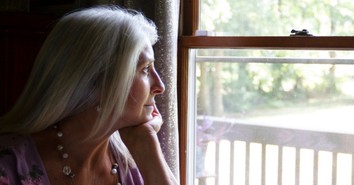Thanksgiving's Greatest Enemy

It has been a frequent topic of conversation lately, during the drive home after school.
"But Mom, why can’t we do that? All my friends at school get to do it! It’s all they ever talk about, and it’s in my face all the time! I just don’t understand!”
I look at my daughter in the rearview mirror, and I see myself. I pause, knowing that a lecture is not what she needs in this moment of genuine frustration.
It’s one of those times when I need to take the log out of my own eye before trying to remove the speck out of hers. I tell her I understand. That I know how she feels. That I feel that way too, sometimes. Okay, a lot of the time.
As we wait for the traffic light to turn green, we talk about that vicious cycle that leads to ingratitude. Through continual experience, I’ve come to learn that thanksgiving’s greatest enemy (and I’m not just talking about the holiday; I’m talking about the experience and expression of being grateful) is not simply ingratitude. It starts much sooner than that.
It begins with negative comparison.
As soon as I start looking at what other people have that I don’t possess, I’m instantly discontent. And as soon as I’m discontent, I’m no longer grateful for what I do have. The seed is planted in the fertile soil of comparison, gets watered by discontentment and quickly sprouts into a spreading weed of ungratefulness.
It happens fast. And far too often.
Satan has been using the same trick since the beginning: “Look at what you don’t have. Doesn’t it look good?” He said it to Eve, and he says it to me. I’d venture to guess he has said the same to you, as well. Eve looked down at her palms and saw empty hands. Don’t we do the very same today? We look around at what others have, then we glance down at what we don’t have, and we want more. We forget that what we have in our hearts through the Lord Jesus is far more valuable than any earthly treasure.
In her book, Compared to Her, author Sophie de Witt writes about something she calls Compulsive Comparison Syndrome, or CCS. It’s the frequent temptation we all face as fallen human beings to compare ourselves to others, whether we are comparing up or comparing down.
At its heart, Sophie writes, is our natural tendency to place ourselves in the center. She writes, “Measuring ourselves against others, desiring a better position, is a direct result of us taking God’s place at the center of the world and looking for blessing in things that are not our Creator.” She goes on to say, “In a world where ‘I’ am at the center instead of God, CCS will be a constant companion. It has to be.”
Do you find that comparison is a constant companion? Do you, like my daughter, get in the car everyday and think, “Why can’t I have those things? It’s just not fair!”
If so, what needs to change?
I love Ann Voskamp’s Joy Dare. She challenges readers to list three things they are thankful for every day. At the end of the year, that list will total a whopping 1,000 gifts of gratitude. She explains, “when thanks to God becomes a habit — so joy in God becomes your life.”
When thanksgiving’s enemy comes knocking at your door, what will you do? If you let him in, he will only multiply, and soon fill the table of your heart. If you close the door and give thanks for what you already have through Christ, discontentment and ingratitude will slink away and disappear, and gratitude will abound.
In Philippians 4:12, the Apostle Paul writes, “I know what it is to be in need, and I know what it is to have plenty. I have learned the secret of being content in any and every situation, whether well fed or hungry, whether living in plenty or in want.” So what is the secret of being content?
Sophie de Witt reveals the answer: “Knowing Jesus, and knowing we have all we need in knowing Jesus, leads to a real, lasting, deep contentment.” On the flip side, if you don’t know Jesus, you won’t know contentment, either.
But is it really possible to get rid of comparing ourselves to others, this side of heaven?
According to Sophie, “The solution to CCS is not simply to stop all comparisons. It’s to find blessed contentment in Christ, and practice healthy comparison. How do we know the difference? By looking at what comparison produces. If it’s praise to God, prayer for ourselves, and prayer and practical love for others, then it’s healthy. If it’s envy, or despair, or pride, or any other symptom of CCS, then we’re allowing something other than Christ to be what we look to for blessing.”
The surefire way to shipwreck thanksgiving is through negative comparison. Let’s ask the Lord to help us see how much we really have in Christ, and be grateful.

Originally published November 25, 2014.





